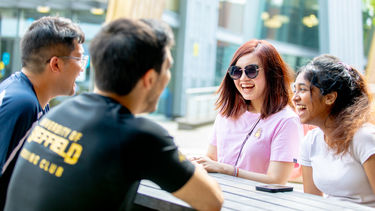My course helped me secure a PhD scholarship to study marine biology in Australia!

At Sheffield I did the MBiolSci course and I really enjoyed it! I was lucky enough to do some really cool fieldwork during my four years and got involved in some great projects. I do think the diversity of modules available to us from second year onwards was great and it enabled me to find what I enjoyed best about biology and focus my studies around that.
One stand-out module was the second year module: Talking the Talk which was a fantastic insight into the technical side of science communication through TV. Our team made a film on medical detection dogs and we were even able to find some very young puppies to play with and film!
I remember that week we worked really hard and put in a lot of hours but it was so much fun and our film ending up scoring really high.
Between second and third year, I went on the field trip to Borneo and this absolutely confirmed my love for outdoor, tropical fieldwork. It is exhausting but the rainforest is such an exciting place and we were so lucky to be living there for a week.
In Ecuador we travelled up and down the Andes in the Amazon Rainforest catching Heliconius butterflies at different altitudes.
Jennie Smith
MBiolSci Biology
In the time we were there we had a chance to explore the environment and do a mini research project - ours was on the seed dispersal ability of dipterocarp trees (which are enormous!!). This trip was definitely a big reason I was attracted the course in Sheffield and it exceeded expectations - we even saw a wild orangutan and her baby!
During third year I volunteered in Dr Nicola Nadeau's Heliconius lab, assisting a masters student in the butterfly insectary. This involved taking notes and timing experiments a few times a week and attending lab meetings. When it came to deciding what to do for my masters, I was really unsure about what to do, whether to stay in Sheffield or to specialise elsewhere.
This is when I was really lucky and Nicola told me she had a PhD student, Gabby Montejo-Kovacevich, working with Heliconius and doing fieldwork over summer in Ecuador and she might need a research assistant! This was such a cool opportunity and we were able to organise the fieldwork to suit my masters project as well!
I was granted the Animal and Plant Sciences Scurfield Memorial Bursary and so even got money towards my travel to South America. In Ecuador we travelled up and down the Andes in the Amazon Rainforest catching Heliconius butterflies at different altitudes.
Back in Sheffield I was looking at whether the butterflies had different morphologies depending on their altitude. Together with Gabby, we found some really cool results which we are hoping to publish soon!
I had the best year getting involved in loads of different projects across ZSL and being based at the zoo
Jennie Smith
MBiolSci Biology
Something else I loved about my time in Sheffield was during my final year I was working on a 100 hours project funded by the University to help re-curate the insect collection in the Alfred Denny Museum.
Working so closely with the fragile specimens was such a privilege and the museum is absolutely full of treasures. I can't recommend enough getting involved with the museum and spending some time in there getting to know what they have!
After my masters year I secured a year-long internship at the Institute of Zoology (IoZ) at the Zoological Society of London (ZSL London Zoo). I was based in the IoZ and worked on a project about species that are on the move in response to climate change in the UK.
I had the best year getting involved in loads of different projects across ZSL and being based at the zoo, I made a cool video to summarise my year – you can find it here.
Aside from my studies I am a keen SCUBA diver (at which point I will also highly recommend the Uni Dive Club - SUSAC) and have wanted to combine the two and study marine biology at a higher level - I've been looking for marine PhD positions for a while.
Finding a position has been really hard - there are loads of things to consider and particularly funding has been difficult. But a few weeks before my internship in London ended, I finally received confirmation of a place and scholarship to study a PhD in marine biology at the University of Tasmania, Australia! I have just arrived in Hobart this week and I am super excited to get started on this really soon!

International Merit Scholarships
We offer a generous package of financial support for international students including 75 undergraduate scholarships worth £10,000 towards the annual tuition fee and 125 postgraduate taught scholarships worth £5,000 towards the tuition fee. Applications are now open for existing offer holders.

.jpeg.jpg?itok=lwc0P5NA)